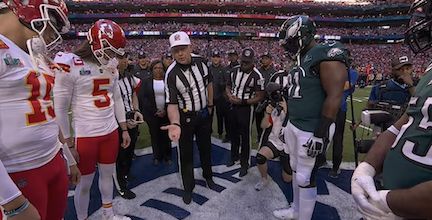Two Kinds of Fairness
What do we mean when we say life is or is not fair? God, in His infinite wisdom, does not operate with just one definition of fairness, but juggles two.
The most obvious form of fairness is the strict administration of justice, where everyone gets exactly what they deserve, no more, no less.

However, an alternative type of fairness is achieved through impartiality, where everyone is treated the same, regardless of merit.
For example, when two teams flip a coin to determine who gets the ball first, the outcome has nothing to do with which team is more deserving. A coin is flipped because the result is impartial, and that’s what makes it fair.

So randomness is fair when it shows no favoritism, while justice is fair when it does. In what sense, then, does God seek to be fair with us? Is it with the justice of a gavel striking the sound block, or with the impartiality of a coin spinning through the air?
Jesus addressed this issue head-on when he said, “Love those who are lovable. Pray for those who are deserving of your support, that you may be just like your Father in heaven. For He causes the sun to shine on the virtuous, and He directs the rain to fall exclusively on the fields of the faithful.”
You might be thinking that doesn’t sound much like Jesus, and you'd be right. What I just cited was what Bizarro Jesus might have said if he hailed from an alternate reality where justice, not grace, reigned supreme. The actual words of Jesus, hailing from our reality, where grace is the name of the game, are as follows: “But I say to you, love your enemies, bless those who curse you, do good to those who hate you, and pray for those who spitefully use you and persecute you, that you may be sons of your Father in heaven; for He makes His sun rise on the evil and on the good, and sends rain on the just and on the unjust” (Matthew 5:44-45, NKJV).
According to Jesus, God is fair, not with a fairness that rewards the deserving, but with a fairness that demonstrates the equal value that He places on each of us. In other words, God is fair by being uncompromisingly indiscriminate.
The criteria that govern the distribution of the rain are the same criteria by which God determines what circumstances land in our lives. The determining factor is not our personal piety, but God’s boundless, impartial love. As we consider some of the unwanted things that have found their way into our lives, the surprising twist is that it was God’s indiscriminate love, not His judgment, displeasure or indifference, that placed them there!
People of faith often suggest that there are no accidents in life. Actually, there are, but according to this passage of Scripture, they’re all on purpose! Through an arbitrary distribution of life’s circumstances, God is fair while simultaneously demonstrating the indiscriminate nature of His love for all humanity.
Random Pieces of Life's Puzzle
A friend of mine once gave me a thousand-piece puzzle. It was a beautiful picture on the box, an ocean sunset with waves crashing against the rocks. Excited, I poured the pieces onto the table and started working.

At first, it was fun. Fitting the edges and finding the bright colors of the sky. But as the hours passed, frustration crept in. Some pieces didn’t seem to fit anywhere. Others looked like they belonged but were just a little off. After a while, I was tempted to give up. It felt like a mess, and I couldn’t see how it would ever come together.
Days later, I returned to the puzzle, unwilling to just walk away without seeing the beauty of the end product.
Slowly, piece by piece, it started to take shape. What once felt like random, useless pieces were actually critical parts of the most beautiful sections.
Life can feel like that unfinished puzzle. There are pieces of pain, confusion, and unanswered questions that don’t seem to fit. But God sees the whole picture when we only see fragments. Even when we don’t understand, we can trust that He is working everything together for our good. The pieces that feel out of place today might be part of a greater masterpiece He is creating in your life.
While it might be tempting to throw your hands up and just walk away, stick with the process. At the other end of patience, perservernace, and endurance comes beauty and joy.
"Consider it pure joy, my brothers and sisters, whenever you face trials of many kinds, because you know that the testing of your faith produces perseverance [endurance]. Let perseverance finish its work so that you may be mature and complete, not lacking anything" (James 1:2-4).
"Not only that, but we rejoice in our sufferings, knowing that suffering produces endurance, and endurance produces character, and character produces hope" (Romans 5:3-4, ESV).
"When There Is No News" God's Presence Is Constant
On April 18, 1930, the BBC announced, “There is no news.”
On April 18, 1930, nothing at all newsworthy occurred — at least according to the BBC. At the start of its regular news broadcast at 8:45 p.m., the BBC announced, “Good evening. Today is Good Friday. There is no news.” This unexpected declaration was followed by 15 minutes of piano music, before the radio station resumed its broadcast of Wagner’s opera Parsifal.

In our fast-paced, information-saturated world, it might be hard to imagine a day when literally nothing made the news. But even on that date so long ago, the stunning announcement, “There is no news,” took everyone by surprise.
Now, think about that for a moment. An entire global news agency, tasked with informing the public, had nothing to report. No headlines. No drama. No crisis. Just ... silence and a little music.
That moment reminds me a lot of the seasons in our spiritual lives when it seems like nothing is happening. We read our Bibles, we pray, we go to church—but we don’t feel goosebumps or hear God speak loudly. It’s tempting to think, “God must not be doing anything in my life right now.”
But friends, silence doesn’t mean absence! Just because the headlines of our lives feel quiet doesn't mean God isn't at work behind the scenes. Some of God’s greatest work is done in the stillness.
Psalm 46:10 says, "Be still, and know that I am God."
It doesn’t say, “Be busy,” or “Make some noise.” It says, “Be still.”
In those quiet seasons, God is still sovereign. He’s still shaping you, preparing you, guiding you—even when there’s “no news.”
So the next time your life feels silent, and heaven seems quiet, remember: Just because you don’t see it or hear it, it doesn’t mean God isn’t doing something powerful.
"For God alone, O my soul, wait in silence, for my hope is from him" (Psalms 62:5, ESV).